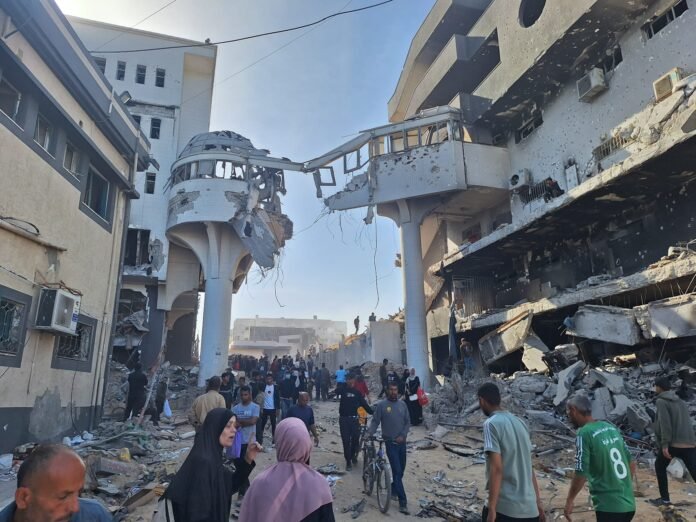Médecins Sans Frontières (MSF) has been forced to suspend its medical activities in Gaza City as renewed bombardments and advancing military forces push dangerously close to its health facilities. (Doctors Without Borders) The move reflects a grim reality: when healthcare itself becomes a war zone, civilians pay the highest price.
A Humanitarian System in Collapse
The war in Gaza has stripped the region’s medical and humanitarian infrastructure to its bones. In its report “Gaza: Life in a Death Trap,” MSF describes how persistent attacks, blockades, and the systematic denial of aid are destroying the very conditions of life in Gaza. (MSF International) More than 14 months of conflict have left hospitals functioning at a fraction of their capacity, many others reduced to rubble. (Médecins Sans Frontières (MSF))
The siege and bombardment have not spared medical personnel either. MSF teams have been shot at, ambulances targeted, and operations constantly threatened by shifting frontlines. (MSF International) Amid such risks, MSF now cites urgent safety concerns as the reason for pausing activity in Gaza City. (Doctors Without Borders)
This suspension is not isolated. In southern Gaza clinics, MSF has documented 1,380 casualties arriving between 7 June and 24 July 2025—28 of them fatally wounded—many suffering injuries from nearby aid distribution sites. (MSF UK) MSF has accused the so-called Gaza Humanitarian Foundation (GHF), a US-Israel run aid distribution network, of turning these sites into lethal traps. (MSF UK)
Facing Escalating Needs
In Gaza City alone, the number of children under five with severe malnutrition has tripled in two weeks, MSF reports. (The Guardian) The clinic’s patient load for malnutrition treatment sites has quadrupled since May. (The Guardian) Among pregnant and breastfeeding women screened, one in four was malnourished. (The Guardian) Globally coordinated aid agencies warn that the use of starvation as a weapon is reaching new levels. (The Guardian)
These realities overlap with dire casualty numbers. MSF Australia states that more than 52,400 Palestinians have died and 118,000 wounded during the conflict. (MSF Australia) The Gaza Health Ministry reports that at least 60,034 Palestinians have been killed and nearly 146,000 injured since October 7, 2023. (The Guardian)
MSF has also flagged the systematic targeting of Gaza’s health infrastructure—hospitals shelled, medical facilities raided, and fuel cut offs crippling generator-based systems. (Middle East Monitor) In many cases, ambulances and health centers have stopped functioning entirely. (Wikipedia)
Why MSF Pulled Out—and What That Means
Stopping operations in Gaza City was a last resort. MSF states that tanks advancing within half a mile of its facilities, along with continuous air strikes, rendered conditions untenable. (Doctors Without Borders) Staff safety, evacuation difficulties, and the danger of collateral damage were critical factors. (Médecins Sans Frontières)
But suspension does not imply withdrawal. MSF continues to operate in the southern and central areas where security allows. (Doctors Without Borders) The organization is mobilizing mobile medical teams, shifting resources to field-based operations, and maintaining support for hospitals where possible. (Médecins Sans Frontières)
Still, this kind of localization of care is limited. When cities fall into active combat zones, hospitals are forced to shut, and intermediaries struggle to reach those in need.
What Needs to Happen Now (and What You Can Do)
For Gaza to survive this moment, the following must occur—and yes, action from outside matters.
1. A sustained ceasefire is urgent
Medical organizations, human rights bodies, and international governments must press for a durable ceasefire. Without it, civilian zones become active battlegrounds and healthcare vanishes.
2. Aid corridors with full protections
Safe, monitored corridors for medical supplies, food, and water must be guaranteed. Distribution points must be protected, not weaponized—for example, the GHF model must be dismantled. (MSF UK) The UN-coordinated system should resume control. (MSF UK)
3. Accountability and transparency
Attacks on healthcare, on aid workers, and on civilians must be documented and submitted to independent bodies. Legal mechanisms can deter abuses. Humanitarian organizations must continue gathering forensic data and sharing verified findings. (MSF International)
4. Scale funding and logistics
Funds pledged must match the scale of the crisis. Donors should allocate resources not just for immediate response, but to rebuild infrastructure. Logistics chains must be secured to prevent delays or obstruction. MSF’s own analysis shows that every stage of supply—from cross-border entry to internal distribution—faces severe blockages. (Médecins Sans Frontières)
5. Engage the public and policymakers
In democratic nations, public pressure shapes foreign policy. Governments must reevaluate arms exports, conditional diplomacy, and humanitarian law enforcement. NGOs and media must maintain vigilance against misinformation. The Gaza war is rife with propaganda efforts and distorted narratives. (Wikipedia)
The Stakes Are Existential
This is not just a battlefield. It is a struggle over survival itself. Gaza’s remaining hospitals are overwhelmed, staff are fatigued and under constant threat, and patients are dying because care simply cannot reach them.
MSF’s suspension in Gaza City signals a turning point. When healthcare collapses, the social fabric begins to unravel. Disease, starvation, and preventable deaths spread unchecked.
For governments, donors, media, and citizens—inaction is complicity. If Gaza’s medical lifeline is to persist, global voices must demand it.
The harsh truth: without urgent intervention, Gaza may soon lack not just hospitals—but hope.
